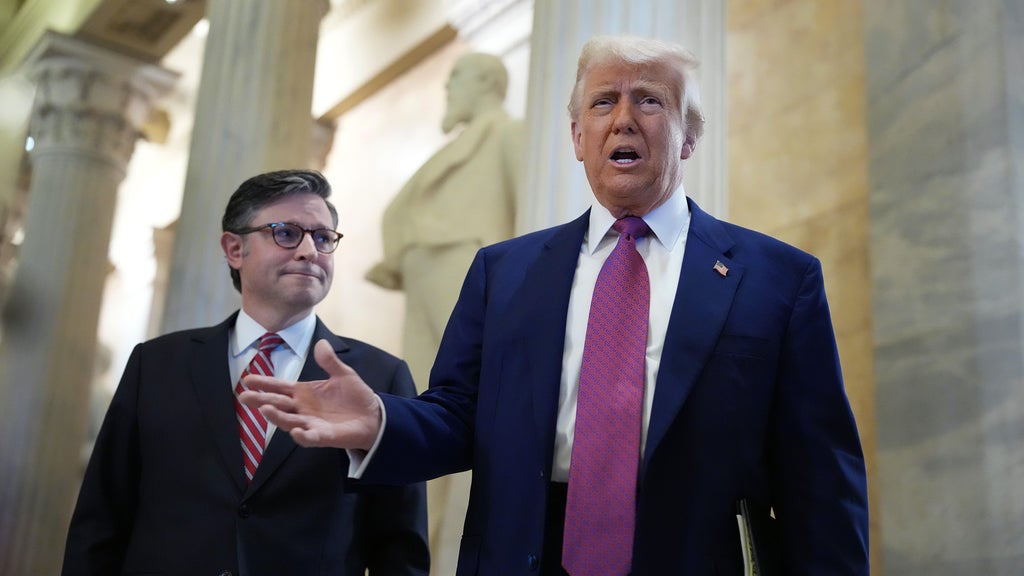
Washington — In a display of political theater, President Trump is set to sign what he calls a “big, beautiful bill” during an Independence Day ceremony at the White House. The event, scheduled for Friday, will bring together several Republican members of Congress who supported the legislation, marking a significant milestone in the president’s domestic policy agenda.
The bill, which has been a source of contention among Republicans, was passed just in time for the self-imposed July 4 deadline. President Trump, who watched the bill’s passage from the White House, celebrated the achievement with a speech in Iowa, declaring the first five months of his second term as “a declaration of independence from a, really, national decline.”
White House press secretary Karoline Leavitt described the legislation as “an encapsulation of all of the policies that the president campaigned on and the American people voted on,” calling it a “victorious day for the American people.”
Contentious Passage and Political Maneuvering
The passage of the bill followed intense negotiations and political maneuvering. House Democratic Leader Hakeem Jeffries set a record for the longest speech on the House floor, yet the legislation passed narrowly with a 218-214 vote. Notably, Republican Representatives Brian Fitzpatrick and Thomas Massie opposed the bill, while no Democrats supported it.
According to sources, GOP leadership and the White House engaged in extensive discussions with Republican holdouts, with President Trump playing a pivotal role through “late-night phone calls.” Vice President Vance was also instrumental in advancing the bill, according to a senior White House official.
Key Provisions of the “Big, Beautiful Bill”
The legislation includes a permanent increase in the child tax credit to $2,200, up from the current $2,000, reversing a planned reduction in 2026. However, it imposes stricter restrictions on Medicaid, potentially affecting millions of low-income and disabled Americans.
The Congressional Budget Office estimates that the bill will result in 11.8 million Americans losing health coverage under Medicaid over the next decade.
Other notable provisions include allowing tipped workers to deduct up to $25,000 of their tips and overtime from taxes, although this expires in 2028. The bill also modifies the Supplemental Nutrition Assistance Program by expanding work requirements and shifting some costs to state governments with higher payment error rates.
The legislation allocates over $46.5 billion for border wall construction, $45 billion for expanding immigrant detention capacity, and approximately $30 billion for U.S. Immigration and Customs Enforcement resources. Additionally, it raises the cap on the state and local tax deduction from $10,000 to $40,000, reverting back after five years.
Implications and Future Challenges
The bill’s passage signifies a major victory for President Trump, yet it also raises significant challenges. By terminating numerous tax incentives from the 2022 Inflation Reduction Act for clean energy and electric vehicles, the legislation could impact progress on environmental initiatives.
Moreover, the bill raises the debt ceiling by $5 trillion, exceeding the initial $4 trillion outlined in the House-passed bill. This increase comes as Congress faces a looming deadline to address the debt limit later this summer.
As the nation prepares to watch President Trump sign this “big, beautiful bill,” the implications of these sweeping changes will unfold in the coming months, affecting millions of Americans and setting the stage for future policy debates.
Event Details
- What: President Trump holds an event to sign his “one big, beautiful bill”
- Date: Friday, July 4, 2025
- Time: After 4 p.m. ET
- Location: White House
- Online stream: Live on CBS News and available on mobile or streaming devices
This development follows a period of intense legislative activity and sets the stage for further political and economic discussions in Washington.






